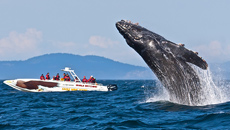"Take a deep breath, look straight, and free yourself," said my trainer Suzanne, looking straight into my eyes even as a shiver went down my spine at the thought of bungee jumping from an 83-metre-high cliff in the direction of the Hyul river way below.
I was at a jumping station at Mohan Chatti in Pauri Garhwal district of Uttrakhand, some 18 km upstream of Rishikesh.
As Suzanne spoke, two other trainers fitted me out with two harnesses - one for the back harness and the other for the ankles.
"The trick of bungee jumping is not to think too much and just savour the moment," said Suzanne, who is from Switzerland and works four to five months a year as a trainer with the Jumpin Heights extreme adventure company.
She assured us that all the safety measures were in place.
"The ankle harness can hold four tonnes of weight in the air," she said with a smile, adding: "So we can actually send a few elephants out there."
After the trainers double-checked everything, right from my weight to the fittings of the harnesses, they asked me to walk forward. I reached the edge of the launch pad and could see the crystal-clear water of the Hyul.
The trainer behind me was not satisfied. He asked me to take a few more steps and asked me to stop only when the front half my feet were hanging in the air.
They asked me not to look down and that I was ready to jump. But I wasn't and when they shouted "3,2,1 bungeee...", I didn't jump!
Supported only with my ankles on an iron pad, I was terrified. Looking at the not so distant hill from where I stood scared me out of my wits.
I was embarrassed and said sorry for all the time that I wasted, but the trainers would have none of it. They wanted to give me another chance and I couldn't say no.
After all, I was a man, I thought, and pumped my false masculine ego as much and as fast as possible.
The trainers took their positions again and started yelling "3,2, 1.."
And before they could say bungee I was in the air.
With my ankles up and head down, the force of gravity fast pulled me down towards the Hyul.
I kept my eyes open as I zoomed past the air at a speed that I thought for a few seconds couldn't be less than that of light.
I felt as if I came from a different planet to witness how humans live on the earth.
The thrill of the fast free fall lasted only for a few seconds, but the adrenaline rush didn't stop even after the elastic chord tied to my ankle threw me a few metres up just before I could touch water of the Hyul.
The only words that came out of my mouth at that time were, "Yes, I have done it."
I kept yelling those words till someone from below asked me to stop. I felt proud.
There were two men standing below and they pulled me down with the help of a strap and put me on a stretcher as they unbuttoned the harnesses.
And when I got up, they gave me a 500 ml bottle of mineral water and a black badge.
"I have got guts," it declared.
I trekked back to the reception counter, collected my belongings and headed towards my hotel in Tapovan in a bungee coach - mini vans that ferry the adventure seekers from their hotels.
In the afternoon, I found a German Bakery facing the Ganges near Lakshman Jhula and with a cup of filter coffee in my hand I just watched the emerald green water of the Ganges flow by.
And nothing felt better...
Getting to Rishikesh:
Nearest airport from Delhi: Jolly Grant Airport or Dehradun Airport (25 km from Rishikesh)
Nearest railway Station from Delhi: Hardwar (25 km from Rishikesh)
By Road: 230 km from Delhi
To reach the jump zone of Jumpin Heights, travel another 18 km on the road to Neelkanth from Lakshman Jhula.
Cost: Bungee jumping - Rs.3,000 per jump. Other activites - Flying Fox (Rs.1,500), Giant Swing (Rs.2,500).
In Flying Fox, you are harnessed to a wire and reach a maximum of speed of 160 km while flying past 1.5 km a few metres above the river.
Bungee Jumping and Giant Swing are similar except that in the latter, you are fitted with a seat and chest harness which is connected to fixed wire ropes.
Best time to bungee is between April and June - after the winter when there is no fog and before the onset of monsoon when the river below can rise.
Accommodation:
A large number of budget hotels are available in the Tapovan area near Lakshman Jhula. Rates start from around Rs.1,000 per night.
Safety Tips: Be honest while filling up the form (declaring your medical condition) before taking the jump.
Eating Out: Multi-cuisine restaurants dot the streets of Rishikesh, but most of them serve vegetarian food. Some restaurants may serve non-vegetarian food if prior orders are placed.






